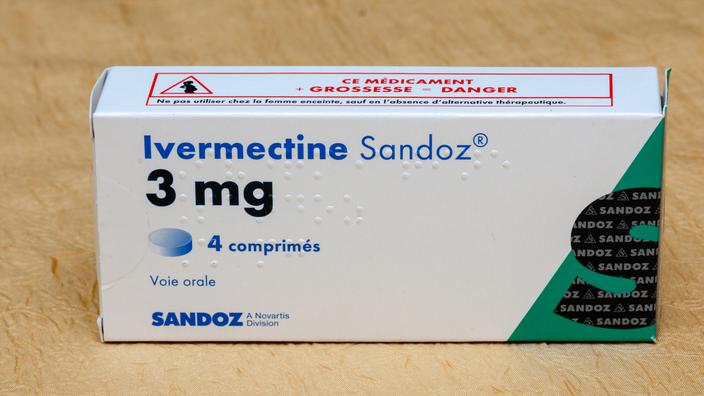Since the start of the pandemic, several treatments have been promoted by different scientists to fight against Covid-19.
One by one, they were taken up by opponents of the vaccine but discarded by the World Health Organization (WHO) for lack of convincing results.
After hydroxychloroquine in 2020, the “
antivax
”
hobbyhorse
was named ivermectin throughout 2021. This antiparasitic drug, used in the treatment of scabies, is regularly promoted by Patriots boss Florian Philippot, but also the president of Debout la France, Nicolas Dupont-Aignan, who recently claimed to have been treated for Covid-19 thanks to him.
Read alsoIvermectin, miracle or mirage against Covid-19?
Bringing hope, this treatment has been the subject of numerous studies since the start of the pandemic.
Among them, an Israeli experiment echoed by the
Jerusalem Post
last August was widely relayed as proof of the effectiveness of ivermectin.
Led by Professor Eli Schwartz, founder of the Tel Aviv Center for Geographic and Tropical Diseases, on 89 volunteers positive for Covid-19, she intended to prove that the drug could significantly reduce the transmission of the coronavirus.
However, this randomized trial falls into several pitfalls, which opponents of vaccines have not seen fit to address.
The Israeli study, "
of the big nonsense
"
First problem: "
It's a preprint that dates from Methuselah,
" notes Mathieu Molimard, pharmacologist and member of the board of directors of the French Society of Pharmacology and Therapeutics (SFPT). The study, carried out between May 15, 2020 and the end of January 2021, has indeed still not been published in a scientific journal. This is the problem with most of the clinical studies recently published on ivermectin: they are simple preprints that have not been reviewed and have not been validated by peers.
The second problem with this study, like many others, is that it presents methodological biases that make the results difficult to interpret and do not allow conclusions to be drawn. According to the SFPT, there are several kinds. First of all, the confusion bias, linked to a difference between the groups compared other than the drug tested: age, other concomitant diseases, stage of the patient, placebo effect, etc. Then the selection bias, which is characterized by a sample of patients not representative of the population affected by the disease or not in accordance with the objective. There is also a measurement bias, which represents an error in the measurements of the characteristics of the patients studied, and a publication bias, specific to meta-analyzes,which compile the results of numerous studies already carried out.
Read alsoCovid-19: this treatment that remains effective against Omicron
In the case of the Israeli study, there is a real measurement bias, according to Mathieu Molimard. In this case, this is a problem with the threshold cycle value (CT), which gives an estimate of the probable amount of virus present in the patient and establishes a threshold beyond which the patient does not is no longer considered positive. "
Three different thresholds, 40, 35 and 30 are used during the study for the same definition of negativity
", analyzes the pharmacologist. “
During randomization, patients are considered negative if the CT is greater than 40, but afterwards they are ultimately negative when the CT is greater than 35 and when evaluating the effects of ivermectin they are negative at CT greater than 30
”, he explains. In summary, "
a patient between 35 and 40 will be randomized but excluded subsequently and a patient between 30 and 35 will be considered positive on inclusion but negative six days later with these same values: it's nonsense
”.
Bias or misinterpreted studies
Studies published in a scientific journal may also have their biases. For example, an Australian study carried out in June 2020 in vitro on laboratory cells concluded that ivermectin had a potential effect on Covid-19, namely a decrease in the replication of the virus. But as SFPT points out, the Vero cells used in this study are "
irrelevant for exploring SARS-CoV-2 infection since the enzymatic mechanisms necessary for the virus to act in human cells are absent
" from these cells. In addition, "
the concentration at which ivermectin has a therapeutic effect on Covid-19 in vitro is 35 times higher than the peak concentration obtained after administration of the recommended oral dose inman
», Analyzes the SFPT, which lists on its site the numerous examples of biased studies which are nevertheless published.
Read alsoVaccine, treatment: Pfizer's double winner against the Covid
Some studies are also misinterpreted by opponents of the vaccine.
Like the one carried out in November 2020 by neurobiologist Jean-Pierre Changeux with the Institut Pasteur, and published in the scientific journal EMBO Molecular Medicine last July.
Focusing on "
the anti-Covid 19 efficacy of ivermectin in golden hamsters
", it demonstrated that the drug made it possible, in animals, to reduce certain symptoms.
However, it has failed to prove the effect of treatment against the viral load of Covid-19, as claimed by some "antivax".
A treatment not recommended by the WHO and the EMA
By promoting studies favorable to ivermectin, the “antivax” sphere allows itself to sort out: the WHO has in fact commissioned an independent international group of experts to test the treatment in 16 randomized controlled trials, covering 2407 outpatients or hospitalized patients with Covid-19. And the results were inconclusive, since the researchers "
concluded that the evidence that ivermectin would reduce mortality, the need for mechanical ventilation, the need for hospitalization and the length of time before clinical improvement in Covid-19 patients were "very unreliable", due to the small size of the trials and the methodological limitations of the available trial data,especially the low number of side effects
".
Read alsoCovid-19: ivermectin, the drug that divides scientists
In March 2021, the European Medicines Agency (EMA) and the World Health Organization (WHO) each issued an opinion advising against the use of ivermectin outside of randomized clinical trials. In addition, as reported by SFPT, an analysis of the global pharmacovigilance database, VigiBase, following a publication in the New England Journal of Medicine reported in October 2021 a marked increase in reports of adverse reactions due to ivermectin since May 2020 (date of the first mentions of ivermectin as a potential anti-Covid-19 treatment). As of October 24, 2021, there were 1,726 patients reporting an adverse reaction associated with ivermectin used against Covid-19. A total of 46 cases were serious (including 12 deaths), and among these,32 (including 6 deaths) reported ivermectin as the sole suspect.







/cloudfront-eu-central-1.images.arcpublishing.com/prisa/KLI3SGJIBFDKLPYTO3RST5FOYY.jpg)

